commentary Commentary
Commentary: Why were we shocked by the breakaway Super League? Football’s been dying for a while
Many have come out to denounce the newly announced European Super League as greedy and ambitious, but their hands are not clean either, says John Duerden.
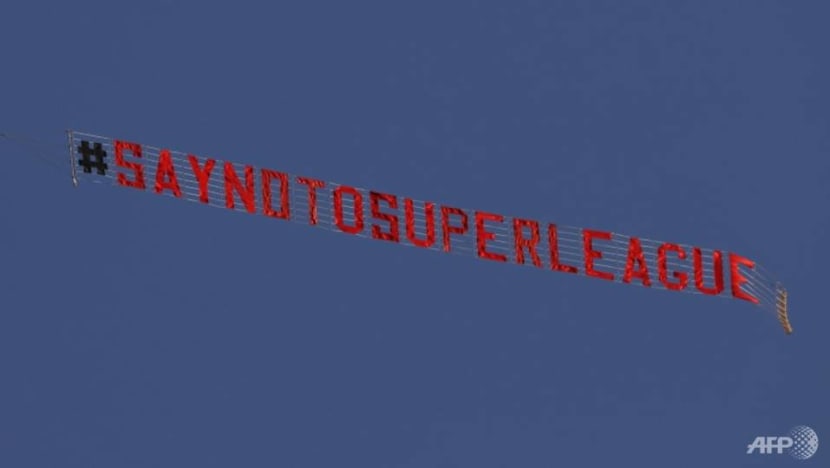
A sign trailed by a plane flying over Elland Road before the match between Leeds and Liverpool with a slogan against a proposed new European Super League. (Photo: AFP/Clive Brunskill)
SINGAPORE: On Sunday (Apr 18), 12 of the biggest clubs in the continent announced that they were forming a European Soccer League (ESL), which shocked everyone.
Liverpool, Manchester United, Arsenal, Chelsea, Manchester City and Tottenham - were involved, alongside Real Madrid, Barcelona, Atletico Madrid, Juventus, Inter Milan and AC Milan.
These would have been permanent members of the league, which they would play in instead of the UEFA Champions League.
READ: Commentary: This new Super League will break football’s essential promise
Acting on their own accord, the clubs said in a statement that three more founding members would be added with five more places available through a qualifying system each year.
This means that there would be something of a “closed shop” at the top level of European football, placing a bomb in the middle of European football.
However, those plans now appear scuppered as six clubs announced their withdrawal from the ESL proposal on Tuesday (Apr 20).
There was talk that the EPL could eject the breakaway competition’s six founding members.
IT ISN'T OVER
In a press conference on Monday (Apr 19), the president of European football’s governing body UEFA, Aleksander Cerefin, turned on the people behind the new league calling them “snakes and liars”.
“In my opinion, this idea is a spit in the face of all football lovers and our societies. So we will not allow them to take it away from us," Cerefin said.
He added that players from these teams were risking their international careers as they “will be banned from playing in the World Cup and Euros and for their national teams.”
READ: Commentary: The English Premier League and European football have a disgusting racism problem
UEFA executives talked of Manchester City, Real Madrid and Chelsea, currently semi-finalists of the UEFA Champions League, being ejected from the competition.
Condemnation came from all corners - official fan groups, British Prime Minister Boris Johnson, former Manchester United manager Sir Alex Ferguson and many more, including the players and managers of some of the clubs that were breaking away.
With the English teams pulling out of this proposal, the ESL proposal, with six teams left, is effectively dead in its current form. But expect a different iteration to return sooner or later.
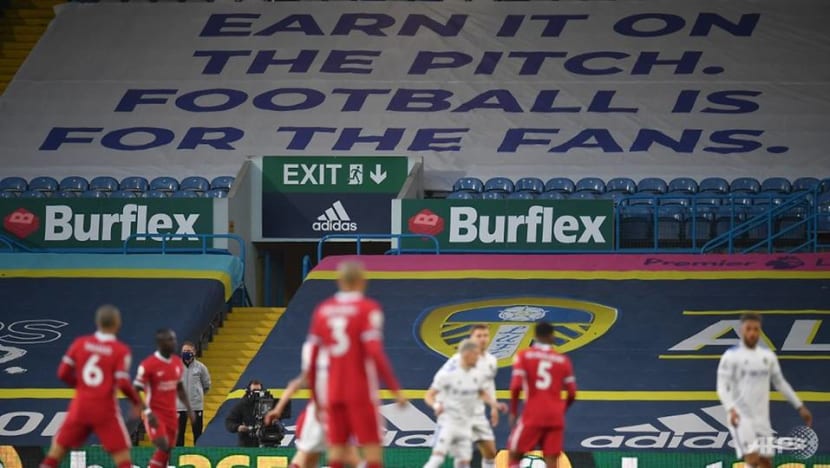
Commercial greed has been dealing football a slow death in front of our eyes for decades now. In fact, some of those who led the charge against the recently announced ESL have themselves been complicit in killing the game and replacing leagues with billion-dollar franchises.
For years, the big clubs in English and European football have wanted a bigger slice of the money they helped generate.
As football became more about the money and less about the sport, the rich have been getting richer.
The main leagues in many of the big European countries have become unequal as top clubs dwarf the rest in terms of broadcasting and sponsorship revenue, commercial reach and the ability to spend obscene amounts of money on players in the transfer market.
READ: Commentary: It is time social media played a more important role for football clubs
The big clubs, having tasted what commercial success feels like, want a bigger slice of the pie and that is why they will continue to seek it even with the ESL now on life support. Call them greedy, but in truth football as a whole has let this happen.
THE ROAD TO ESL
Take the EPL for instance. It is ironic that the EPL chiefs had lambasted the six clubs for breaking away because they acted the same way too.
Until 1983, English clubs shared ticket revenue between home and away teams but under pressure from the bigger clubs, this practice, valuable to the smaller ones, stopped.
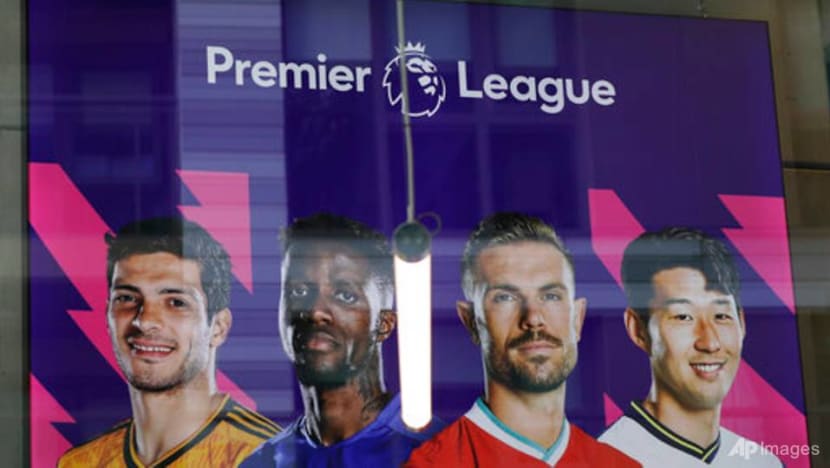
In 1992, the top flight of English football broke away from the existing football league pyramid to set up a new EPL, which attracted lucrative broadcasting revenue shared among the top tier clubs rather than all four divisions.
That broadcasting money helped English clubs compete for top talent around the world and helped to make it the most popular and lucrative league in the world.
More and more fans also flocked to the stadiums despite the price rise in match tickets, which meant some diehard local fans could no longer afford to attend. That didn’t matter too much to the likes of Manchester United and Liverpool as there were plenty more people around England and overseas waiting in line.
READ: Commentary: Are EPL broadcasting rights just too expensive for television now?
“Ever since England’s Premier League was formed in 1992 – itself the result of an elite breakaway – laissez-faire ownership rules, spiralling player salaries and booming broadcasting fees have distorted competition and corrupted the values of the game. The top clubs have become rapacious, profiteering institutions,” said The Guardian in a hard-hitting editorial.
Also in 1992, the continent’s premier knockout competition, the European Cup, became the UEFA Champions League. To guard against the biggest teams being eliminated in the first game, groups were created to guarantee them some games.
This has expanded over the years to become a bigger source of revenue.
DON'T JUST BLAME THE CLUBS
It is ironic that the ESL was announced the day before UEFA was due to announce a new Champions League format that, under pressure from some of those behind the breakaway competition, would ensure more games for the biggest clubs and even reserve places for so-called "elite clubs" that had failed to qualify through their own merits.
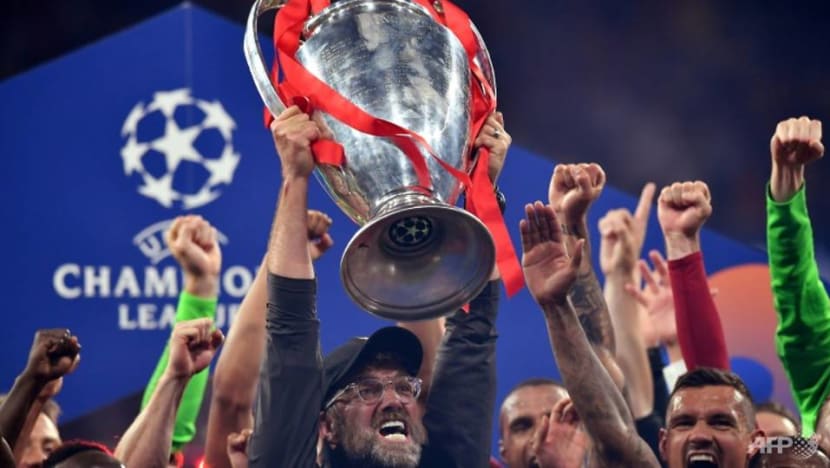
And it’s not just club football that’s chasing the moolah. International football, once played for national pride, is not far behind either. Already, FIFA, football’s world governing body, has been mired in corruption scandals in recent years.
FIFA has also chased new commercial sources for the sport, evident in its award of World Cup hosting rights in new frontier markets such as the US, South Korea, Japan, South Africa and Qatar in recent decades.
READ: Commentary: Spanish domination of European football is nearing its end
UEFA too, moved away from the traditional one or two-host model for the European Championships and instead opted for a complicated pan-continent tournament, postponed to this year from last, aimed at generating more commercial dividends.
As fans, we didn't protest such increase in commercialisation. We, in fact fuelled it. How many of us quietly and complicitly paid higher television subscription fees, ticket prices and merchandise, especially new jerseys farmed out every year with some tweaks.
We knew football was going down the drain, and we let people use our love for the game to make it happen. It remains to be seen if the ESL episode, which has "awakened" our conscience to this reality, will change our behaviour.
ENTER GLOBAL OWNERS
If football’s bureaucrats administered the slow poison that killed the sport, then its billionaire owners created that poison and thus, should share a large part of the blame.
The growing commercial viability of football saw the entrance of new football owners – oligarchs, tycoons and royal-linked sovereign wealth funds – all of whom knew little about football or the local community, but a lot about getting rich. And they ruthlessly brought that culture and approach to the “beautiful game”.
Some of these examples include Russian billionaire Roman Abramovich buying Chelsea in 2003 - who has ruthlessly sacked 10 managers in his 18 years at the club - and Sheikh Mansour of Abu Dhabi taking over Manchester City in 2008.
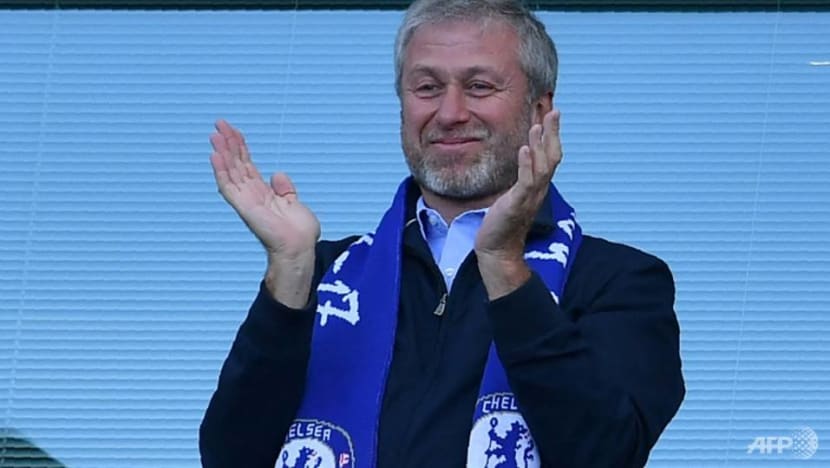
Manchester United, Liverpool and Arsenal were taken over by American businessmen and there have long been suspicions that they were interested in an "American-style franchise league" where there is no relegation and the big clubs are able to maximise their revenue and keep it for themselves.
Only last October it was revealed that Manchester United and Liverpool were behind Project Big Picture - a plan to give the big six control of the EPL decision-making in return for handing over £250 million (US$348 million) to the rest of the teams in the country’s top four divisions.
READ: Commentary: Liverpool and Man Utd have a plan to save smaller English clubs. But no one is trusting them
Examples such as these show that the modern-day owners of the game care little about developing the sport.
The writing for football was already on the wall and remains there despite the hiccup in plans to form the ESL.
We need to accept that football will never be the same. Even if this ESL episode cools off, sooner or later, another breakaway model will come around.
John Duerden has lived in Asia for 20 years and covers the region’s sporting scene. He is the author of three books including Lions & Tigers - The History of Football in Singapore and Malaysia (2017).















